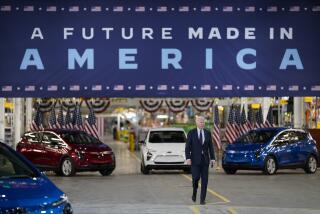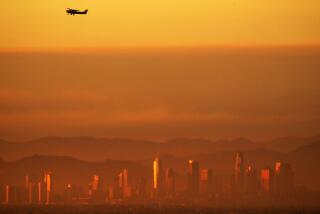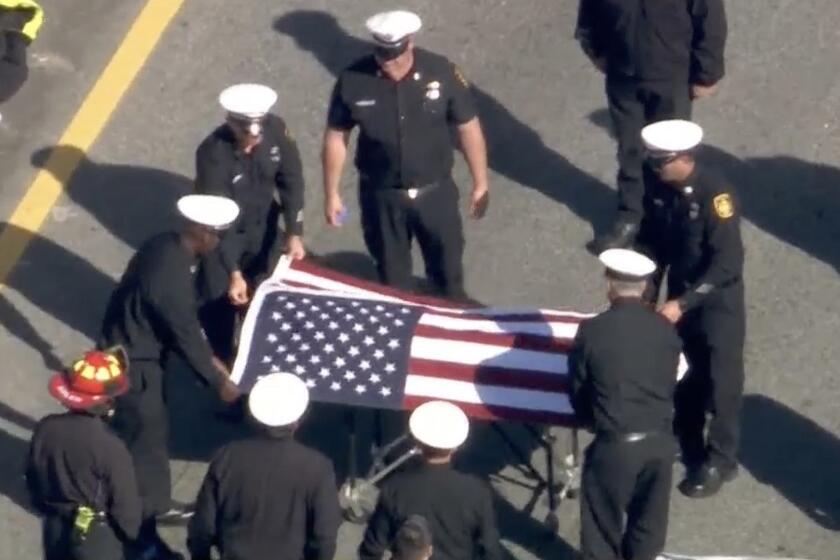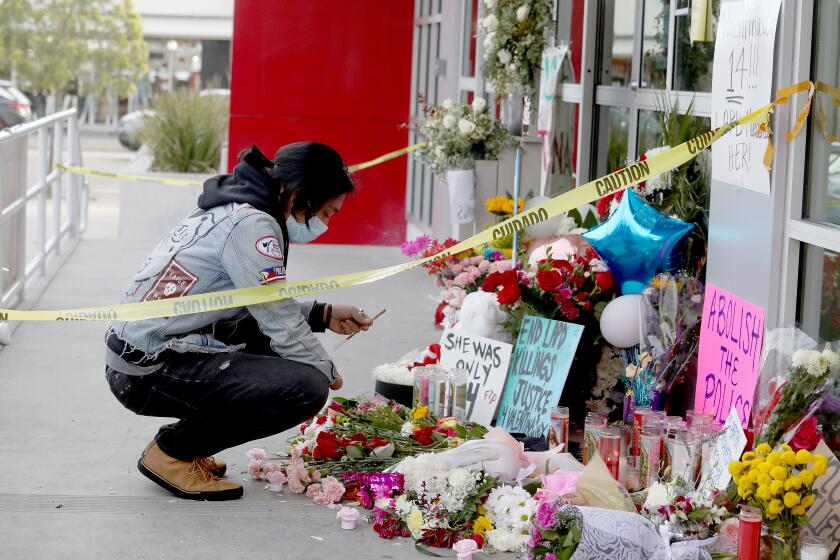Power grab topples another defender of California’s environment
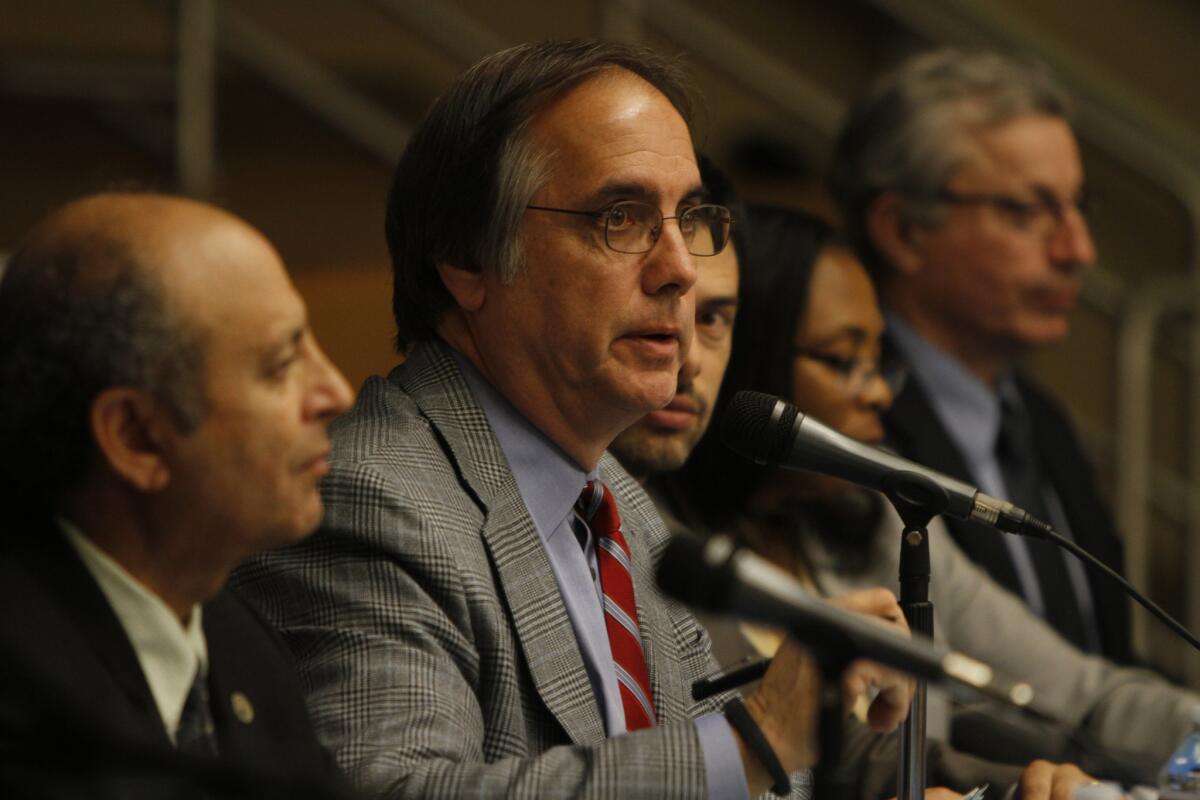
The South Coast Air Quality Management District board fired Barry Wallerstein, center, the agency’s longtime leader, despite pleas from environmentalists and public health experts.
It was like a sequel to a bad movie.
One month after I watched the California Coastal Commission whack the executive whose career was devoted to preserving and assuring equal access to the state’s greatest treasure, I went to Diamond Bar on Friday to watch another massacre.
This time the target was a man with more than three decades of experience fighting smog and improving public health in a region with some of the dirtiest air in the nation.
The South Coast Air Quality Management District ignored pleas from environmentalists and public health experts and told Barry Wallerstein to get lost.
Yes, there are similarities between these two executions.
In Morro Bay, hundreds of coastal stewards praised Executive Director Charles Lester. They pleaded for him to be kept on the job amid fears of advancing influence by developers. Then they watched in horror as the Coastal Commission fired him without a full explanation as to why.
In Diamond Bar, 40 people had nothing but praise for Wallerstein and his diligent efforts to clean up the air, despite pushback from polluters. But it didn’t matter, because AQMD board members went into closed session, came out an hour later and announced that Wallerstein was history.
There was no explanation.
The board members quickly moved on, as if they might still have time to wrap things up and squeeze in a round of golf.
Two of the most powerful regulatory agencies in a progressive state have now been rocked by power grabs, and in each case the public’s wishes were all but ignored.
Wallerstein’s ouster was even more remarkable than the Coastal Commission coup because the executioners were entirely upfront about their objectives.
They think pollution restrictions are too tough on the polluters.
Are you following?
Their only job is to cut smog and save lives in the process. They think we’re moving too fast.
So they began plotting their coup late last year, as explained last week by my colleague Tony Barboza.
Orange County elected officials kicked a clean-energy advocate — Democratic Santa Ana Mayor Miguel Pulido — off the air quality board in November. They replaced him with Republican Lake Forest Councilman Dwight Robinson, a critic of tough pollution restrictions.
“Governments at all levels need to reduce regulations so businesses can thrive,” Orange County’s Republican Party chairman said in a letter of support on the appointment of the new board member.
That gave Republicans a majority on the board, and it now seems that their first order of business was to make sure Wallerstein no longer gets in the way of an agenda all but written by special interests including the petroleum industry, a lobbying and campaign donation titan in California.
Wallerstein didn’t help his cause last December when his staff recommended tougher new emission restrictions. The board instead went for a less demanding plan more to the liking of the Western States Petroleum Assn., among other lobbyists.
Why not just follow the NASCAR driver model and let the commissioners wear uniforms with their sponsors’ logos: Shell, Exxon, Western States, etc.?
In Diamond Bar on Friday, there were two urgent matters before the board.
The first involved a request by the state Senate Environmental Quality Committee that the AQMD toughen up those standards it had approved in December.
A horde of industry representatives and apologists stepped to the podium to say those pollution controls require significant reductions, and tougher standards would cost jobs.
Substitute “money” for “jobs,” and you might get a truer picture of what this is really about.
Chevron was there. The Western States Petroleum Assn. was there. A port industries representative was there.
It was like a Stage 3 Smog Alert.
Among the few people speaking up for tougher pollution controls was Alicia Rivera, who works for Communities for a Better Environment and once took me on a tour of Wilmington, one of Southern California’s most polluted burgs.
At the time she was rallying against an oil-backed ballot proposition to slow implementation of the state’s global warming act.
“We are appalled by what you adopted,” Rivera told the board Friday. “That’s what the industry designed, and they got what they wanted.”
The commission rejected her plea, sided with industry and stuck with its December decision.
Then came the matter of whether to fire Wallerstein.
One after another, his defenders — even those who’d had disagreements with him — praised his work.
A Sierra Club member from South Los Angeles said she’d like to live on the Westside, where the air is cleaner, but can’t afford to. She played a video of her asthmatic son’s struggles to breathe and asked the board to stay true to its mission.
A California Safe Schools representative, Robina Suwol, asked the board to consider the high rates of asthma, birth defects and cancer.
“We do not need to trade employment and wealth to get clean air,” said Suwol. “We can get both.”
Monsignor John Moretta of Resurrection Church In Boyle Heights, who fought with others for years to shut the Exide plant that spewed lead and arsenic contamination over thousands of homes, said Wallerstein had been a partner in the fight to prevent industry from poisoning poor people with impunity.
Andrea Hricko, a professor of preventive medicine at USC, read a letter in support of Wallerstein on behalf of 19 scientists studying the health effects of air pollution.
“Dr. Wallerstein’s leadership and vision have helped to improve air quality and health for millions of residents,” said the letter. “But we still do not have healthy air to breathe in the Southland, and the job is not done.”
Not by a long shot. Although California has made tremendous progress in cutting smog the last 40 years, we still have some of the dirtiest air, thanks mostly to vehicle emissions — and the biggest continued threat to public health is in areas of lower income.
The region would need to cut pollution by an additional 50% to meet federal requirements in 2023, and by 65% in 2032. So there’s still a long way to go, and the small matter of a melting planet to take into account.
But the agency whose job is to get us there might as well change its name to the Fossil Fuels Advisory Board.
After listening to all the pleas for Wallerstein’s job, the board vote to fire him was 7 to 6.
It was along party lines.
Seven Republicans in favor; five Democrats and one independent opposed.
The air you breathe is more politicized now, and at the rate we’re going it will soon be more polluted.
@LATstevelopez
MORE FROM STEVE LOPEZ
With high ticket prices and TV blackouts, Big Sports lose their appeal
If East L.A.’s Latinos speak for the nation’s, a wall could come tumbling down on Trump
‘Disgrace’ isn’t a strong enough word to describe Coastal Commission meeting
More to Read
Start your day right
Sign up for Essential California for news, features and recommendations from the L.A. Times and beyond in your inbox six days a week.
You may occasionally receive promotional content from the Los Angeles Times.


